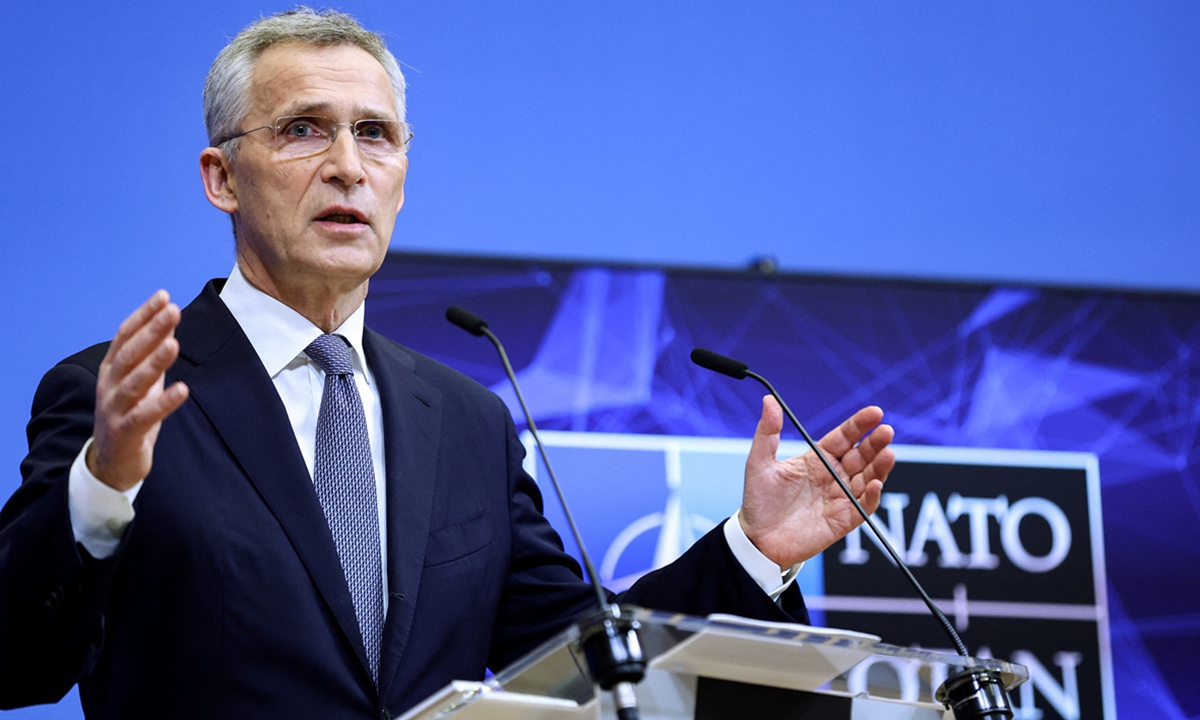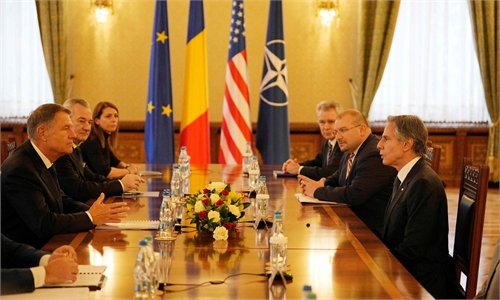
NATO Secretary General Jens Stoltenberg speaks during a press conference ahead of the alliance's Defence Ministers' meeting at the NATO headquarters in Brussels on March 15, 2022. Photo: AFP
NATO has pledged heavy weapon deliveries from the Western allies to Ukraine, while its Secretary General Jens Stoltenberg said on Sunday that he expected "more in the near future." However, the delivery of more heavy weapons will only push Ukraine deeper into the abyss of a proxy war, making negotiations less and less likely, experts warned. At the same time, the parties involved in the war could be deadlocked in the long run.
NATO's latest move came after Ukrainian forces have been strained on the front lines recently. In addition, NATO likely also wants to use the move to show support for Ukrainian President Volodymyr Zelensky, experts said.
In another recent sign that the Russia-Ukraine conflict is actually escalating, Russia and Belarus started a joint air force drill from Monday which will last until February 1, according to the Belarusian Security Council.
Russian forces are embarking on a winter offensive of unprecedented scale and currently have the upper hand in terms of weaponry and morale, Wang Xiaoquan, an expert from the Institute of Russian, East European and Central Asian Studies at the Chinese Academy of Social Sciences, told the Global Times on Monday.
The joint Russia-Belarus exercise could be part of preparations for a Russian winter offensive to deter and hold back the Ukraine forces, thus easing the pressure on Russian forces fighting in the Donbas region, Wang said. "At this point, if the West does not provide more heavy weapons, such as main battle tanks, Ukraine may be at risk of a major defeat."
But the delivery of heavy weapons also means that the situation will not de-escalate anytime soon, Cui Heng, an assistant research fellow from the Center for Russian Studies of East China Normal University, told the Global Times on Monday.
"NATO's attitude also brings the parties further and further away from the negotiating table," he said.
Observers point out that dragging out the war is the main goal of the US-led NATO. The US-led Western strategy is to use Ukraine to drain as much of Russia's power as possible until it is dragged down, they believe.
Thus, the intensity of NATO's military assistance to Ukraine mainly depends on Russian military pressure on the country, Wang said.
The US had been restricting Ukraine's access to larger-scale weapons for a while, fearing that the move would anger Russia. However, when Russia commits more military power and is able to materially change the battlefield situation, Western military assistance to Ukraine will increase, Wang said.
Nonetheless, there is a big question over NATO nations' ability to provide sustained weapons support, observers noted.
After a year of "transfusions" to Ukraine, it has brought NATO's and even the US' weapons stockpiles to low levels, Cui said. "France and Germany, which have the strongest military power in continental Europe, have consistently discounted military aid to Ukraine, although they have not explicitly refused it."
"Ukraine has been caught up in a proxy war, and it will be further pushed into the abyss," he warned. "When heavy weapons are funneled to positions in Ukraine, there is likely to be a long-term deadlock for all parties who are in fact involved in the war."

